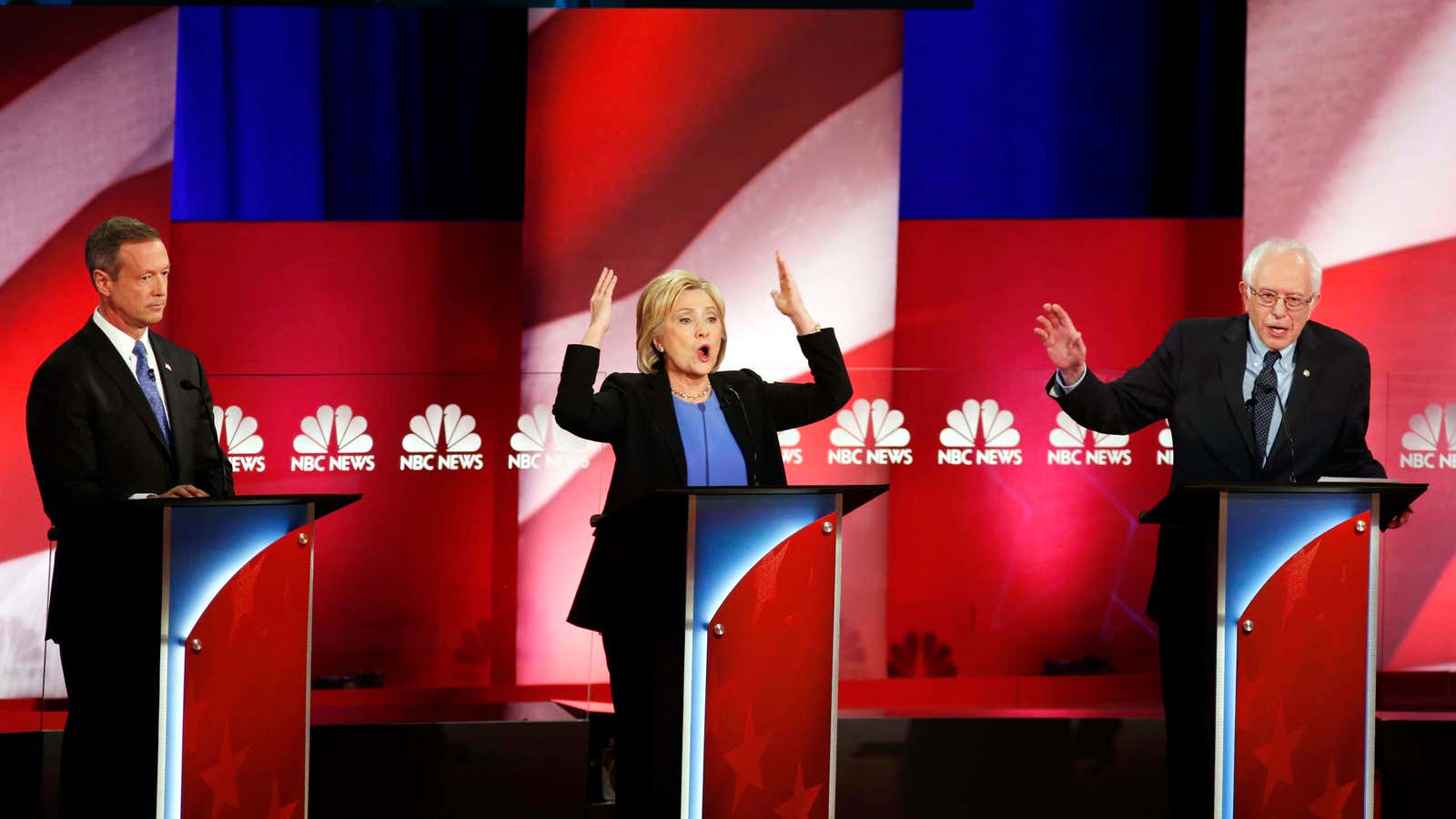As the Democratic presidential primary gets tighter (pdf), former Secretary of State Hillary Clinton is taking the unusual tack of reminding her party’s core voters that their biggest dreams aren’t necessarily within easy reach.
After Saturday’s Democratic debate, pundits argued that Clinton’s attacks on Sen. Bernie Sanders “reinforced his characterization of her as an establishment politician so desperate she’d say anything to win.” It’s an oft-repeated criticism of Clinton that goes back to 2007, when Hillary was running against Barack Obama, and even has echoes of 1992, when one of Bill Clinton’s rivals labeled him a “pander bear.“
But this analysis gets the 2016 dynamic precisely wrong—if anything, Clinton’s refusal to match Sanders’ extravagant promises is her biggest weakness in the Democratic primary.
Take the biggest recent point of friction between the two campaigns: Bernie Sanders’ proposal for a single-payer health care system.
Clinton and her campaign have criticized Sanders for not being up-front about the costs of the plan and, more cynically, suggested that re-opening the healthcare debate could give Republicans an opportunity to dismantle the existing array of programs that help needy Americans.
Sanders has brushed those critiques aside, telling voters at the most recent debate that “we’re not going to tear up the Affordable Care Act. I helped write it. But we are going to move on top of that to a Medicare-for-all system.”
But Sanders isn’t really talking about Medicare-for-all; his plan would require $13.7 trillion in tax hikes to finance a new, single-payer health care system, where most Americans wouldn’t pay insurance premiums. The plan promises cost savings without detailing them, other than negotiating with pharmaceutical companies for cheaper drugs.
That’s a start, but it won’t be enough—Sanders will need to figure out how to pay doctors and hospitals less, and figure out how to decide which treatments will be covered. These are among the devilish details that blew up Clinton’s 1993 health care effort and lay the groundwork for Obamacare’s complex system of moving parts.
Clinton is making the case for incremental steps toward true universal coverage. Better to work through the existing framework—which essentially smuggles the idea of health care as a right into the US health care system—than re-open a contentious public debate on the role of government.
“We finally have a path to universal health care,” she said at the debate. “We have accomplished so much already. I do not to want see the Republicans repeal it, and I don’t to want see us start over again with a contentious debate. I want us to defend and build on the Affordable Care Act and improve it.”
Now, you can call this a lot of things—realistic and pragmatic, or cynical and small-minded—but given the electorate at hand, it’s hardly “saying anything to win.” You can see the same dynamic at work in campaign conflicts over Sanders’ plan for free public college, which Clinton has criticized as a hand-out to the children of the wealthy, or his totally untenable scheme to break up the banks, where Clinton has stuck gamely to using higher capital ratios and more stringent regulation to prevent future bailouts.
That’s not to say that Clinton hasn’t moved left for this election—her long-telegraphed objections to the TPP are one sign that she is willing to make at least some concessions to the base.
Numerous pundits have pointed out that her strategy doesn’t fit with an electorate that wants change versus more of the same. But, as a former member of Obama’s administration, Clinton has little choice but to embrace his pragmatic record along with its conflicted legacy among progressive voters. The good news for the Clinton campaign is that Obama–and Clinton herself—still remain more popular among by the national Democratic voters than Sanders. The bad news is that the voting doesn’t begin until Feb. 1, and Sanders is gaining ground.
Clinton’s decision to tell her party’s core voters that it will take more than one election to accomplish their dearest goals may be accurate, but it’s a big part of the reason that Clinton lags behind among young and liberal Democrats. The senator from Vermont is attracting voters disillusioned by compromise. But there’s a word for telling voters that universal health care, free college and the end of big banks is just a single presidential vote away—and it rhymes with Sanders.
